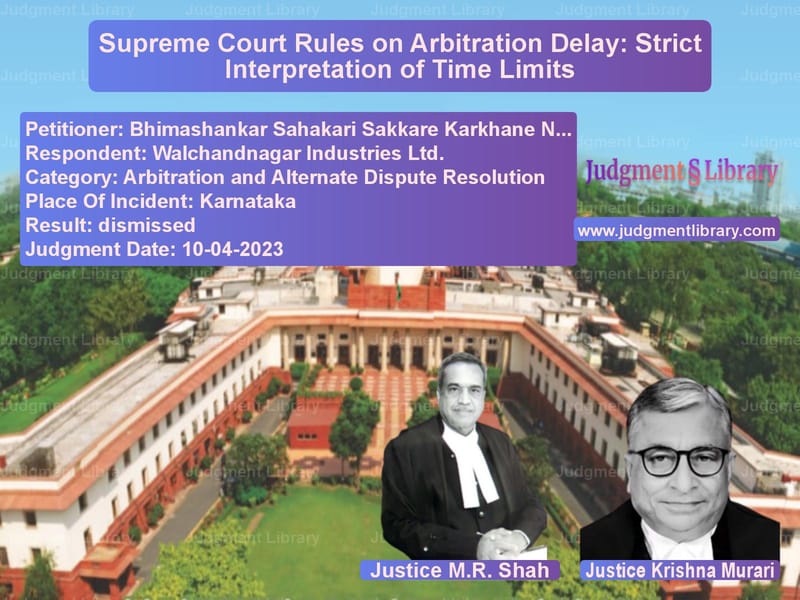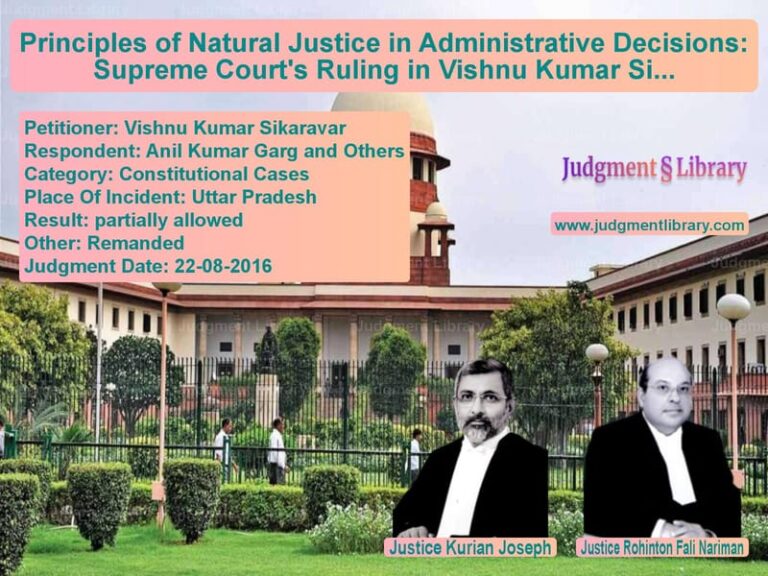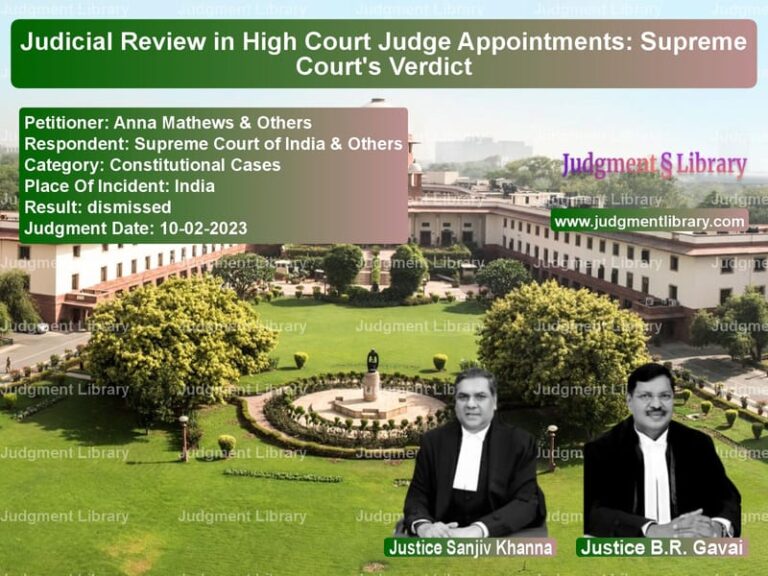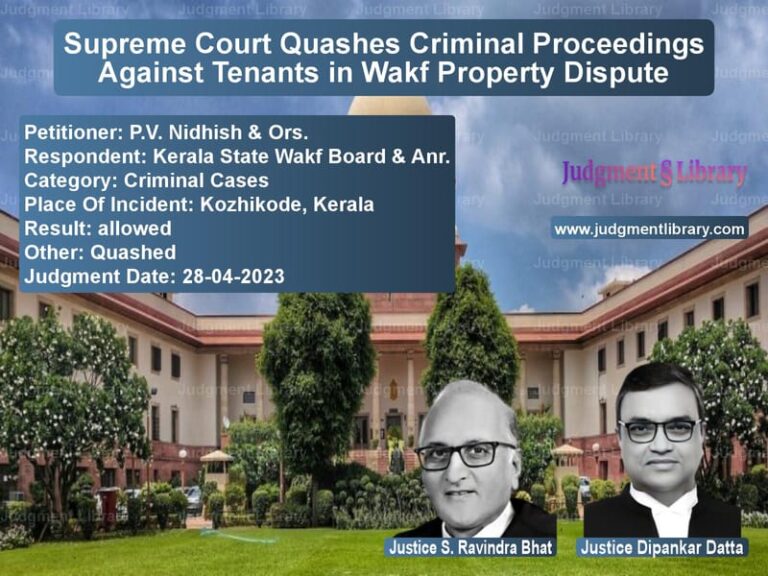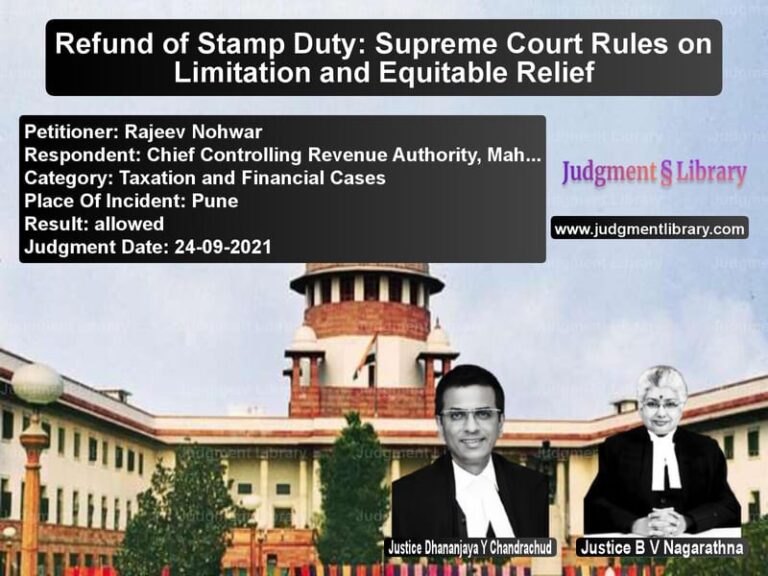Supreme Court Rules on Arbitration Delay: Strict Interpretation of Time Limits
The Supreme Court of India recently ruled in Bhimashankar Sahakari Sakkare Karkhane Niyamita vs. Walchandnagar Industries Ltd., addressing whether an arbitration appeal can be accepted beyond the maximum permissible limit due to court vacations. The Court dismissed the appeal, reinforcing the strict interpretation of time limits under Section 34 of the Arbitration and Conciliation Act, 1996.
Background of the Case
The case revolved around an arbitral award passed on 24 August 2016 against Bhimashankar Sahakari Sakkare Karkhane Niyamita (the appellant). As per Section 34(3) of the Arbitration and Conciliation Act, an application to set aside an arbitral award must be made within three months, extendable by a maximum of 30 days.
Key developments include:
- The 90-day period expired on 24 November 2016.
- The additional 30-day discretionary extension expired on 24 December 2016.
- The courts were closed for winter/Christmas vacation from 19 December 2016 to 1 January 2017.
- The appellant filed its appeal on 2 January 2017, the day courts reopened.
The trial court rejected the application, stating that the filing exceeded the permissible 120-day period. The Karnataka High Court upheld this decision, leading to the present appeal before the Supreme Court.
Arguments of the Petitioner
The appellant, represented by Senior Advocate Shyam Diwan, argued:
- That Section 10 of the General Clauses Act, 1897, should apply, allowing filing on the next working day if the last date falls on a holiday.
- That denying the extension created an unjust distinction between cases affected by court vacations and those unaffected.
- That the ruling in Assam Urban Water Supply and Sewerage Board vs. Subash Projects and Marketing Ltd. failed to consider Section 10 of the General Clauses Act, which should override Section 4 of the Limitation Act.
- That barring the appeal caused grave injustice, preventing the appellant from contesting the award due to technical reasons.
Arguments of the Respondent
Senior Advocate Dhruv Mehta, representing Walchandnagar Industries Ltd., countered:
- That Section 34(3) of the Arbitration Act explicitly limits the condonable period to 30 days, barring further extensions.
- That the phrase “but not thereafter” in Section 34(3) acts as an express exclusion of Section 5 of the Limitation Act.
- That the Supreme Court in Union of India vs. Popular Construction Co. had already ruled that arbitration timelines cannot be extended beyond what the Act prescribes.
- That Section 10 of the General Clauses Act does not apply, as arbitration proceedings fall under the purview of the Limitation Act, which overrides it.
Supreme Court’s Observations
The Supreme Court, led by Justices M.R. Shah and Krishna Murari, made the following key observations:
- “The term ‘prescribed period’ under Section 34(3) means three months, and the additional 30-day period is discretionary, not part of the prescribed period.”
- “The explicit use of ‘but not thereafter’ in Section 34(3) prohibits any extension beyond the prescribed 120-day period.”
- “The decision in Assam Urban Water Supply is binding and correctly interprets the law.”
- “Section 10 of the General Clauses Act does not apply when a special law (the Arbitration Act) has its own limitation provisions.”
- “Allowing this appeal would defeat the purpose of arbitration, which requires time-bound dispute resolution.”
Final Judgment
The Supreme Court ruled:
- The appeal was time-barred and not maintainable.
- The trial court and High Court were correct in refusing to condone the delay.
- The strict timeline under the Arbitration Act must be followed to preserve the efficiency of the arbitration process.
Implications of the Judgment
This ruling has significant implications for arbitration law:
- Strict Enforcement of Time Limits: Courts cannot extend deadlines beyond the prescribed period under the Arbitration Act.
- Exclusion of Limitation Extensions: The ruling affirms that arbitration is a special law with its own rules, overriding general provisions like Section 10 of the General Clauses Act.
- Efficiency in Arbitration: The decision reinforces that arbitration proceedings must be resolved swiftly, without procedural delays.
Conclusion
The Supreme Court’s ruling in Bhimashankar Sahakari Sakkare Karkhane Niyamita vs. Walchandnagar Industries Ltd. is a landmark decision that reinforces the strict application of arbitration timelines. By denying further extensions beyond the prescribed period, the Court has upheld the principle that arbitration must remain a time-efficient dispute resolution mechanism. The decision clarifies that procedural delays, even those caused by court vacations, cannot override statutory time limits.
Petitioner Name: Bhimashankar Sahakari Sakkare Karkhane Niyamita.Respondent Name: Walchandnagar Industries Ltd..Judgment By: Justice M.R. Shah, Justice Krishna Murari.Place Of Incident: Karnataka.Judgment Date: 10-04-2023.
Don’t miss out on the full details! Download the complete judgment in PDF format below and gain valuable insights instantly!
Download Judgment: bhimashankar-sahakar-vs-walchandnagar-indust-supreme-court-of-india-judgment-dated-10-04-2023.pdf
Directly Download Judgment: Directly download this Judgment
See all petitions in Arbitration Awards
See all petitions in Dispute Resolution Mechanisms
See all petitions in Enforcement of Awards
See all petitions in Judgment by Mukeshkumar Rasikbhai Shah
See all petitions in Judgment by Krishna Murari
See all petitions in dismissed
See all petitions in supreme court of India judgments April 2023
See all petitions in 2023 judgments
See all posts in Arbitration and Alternate Dispute Resolution Category
See all allowed petitions in Arbitration and Alternate Dispute Resolution Category
See all Dismissed petitions in Arbitration and Alternate Dispute Resolution Category
See all partially allowed petitions in Arbitration and Alternate Dispute Resolution Category

